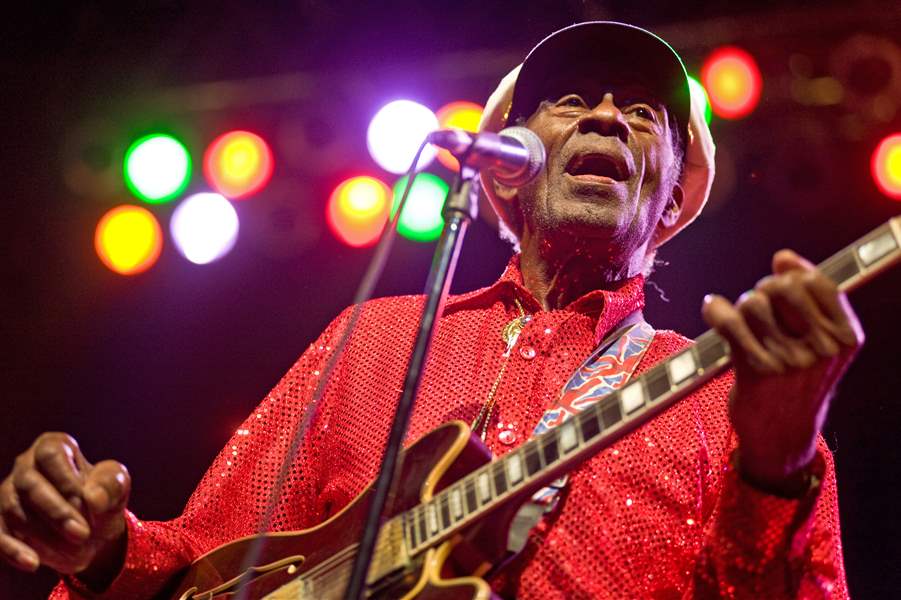
Berry helped build rock — then took it for a ride
3/21/2017
Chuck Berry was just shy of 30 years old when he embarked on his recording career in 1955. The guitar legend died Saturday at his home west of St. Louis. He was 90.
Getty Images
Even if Chuck Berry never sang all of those beautiful words about V8s, jitneys, limousines, and Coupe de Villes, it was obvious that he was making a new kind of car music. His songs started like engines. A guitar riff would stutter like a crankshaft, then the beat would kick in, and suddenly everything smelled like motor oil and hormones.

Flowers and well wishes are left below a statue of singer and musician Chuck Berry in University City, Mo.
This new vroom-vroom music was dubbed rock ‘n’ roll, and its founding father — who died in Missouri on Saturday at 90 — made it with an electric guitar, a surplus of charisma, and the knowledge that teenage hearts have always pumped desire. And so Berry instantly became one of civilization’s finest songwriters, offering marvelously detailed accounts of anticipation, possibility, and mobility — social, sexual, and the like.
That meant lots of odes to fast girls and faster cars, but ultimately, Berry was teaching America’s post-war babies how to best live in a democracy. You had choices. Having “no particular place to go” meant you could go anywhere.
Berry was zooming toward reverie most of the time. In 1958, he invites “Carol” to “climb into my machine so we can cruise on out” to a juke joint specializing in a new kind of euphoria. In 1957’s “Rock and Roll Music,” he takes his flame “across the tracks” to listen to the delirious thump of that still-unshakable backbeat.
Berry was driving the rest of us in the direction of ecstasy too — often on a smooth ribbon of beautiful blacktop. In the unflinchingly patriotic “Back in the U.S.A.,” his narrator returns from a trip overseas and practically drops to his knees to kiss “the long freeway.”

Chuck Berry was just shy of 30 years old when he embarked on his recording career in 1955. The guitar legend died Saturday at his home west of St. Louis. He was 90.
He occasionally found paradise on foot. Over the jingle-and-bounce of “School Days,” Berry recounts eagerly bolting out of a classroom and casually strolling onto a dance floor, a sacred place where everyone is “feeling the music from head to toe.” It’s one of his many tutorials on how to let the rhythms of rock ‘n’ roll take full possession of your body. Or maybe he’s just explaining what this music seems to do to our hips against our volition.
Either way, Berry wasn’t singing to his peers — he was just shy of 30 years old when he embarked on his recording career in 1955, but while he considered himself more of a businessman than a medium, neither his age nor his entrepreneurship dimmed the magic of the music he made in the first 10 years of his career. In his durable rock history book, Awopbopaloobop Alopbamboom, Nik Cohn wrote that Berry’s music taps directly into “the Teendream myth that’s right at the heart of all pop.” And we still haven’t outgrown it.
That’s because mobility and desire still occupy such massive swaths of the American psyche, and our pop music proves it. We’ve enjoyed a glorious pile-up of lusty car songs in Berry’s wake — from Prince’s “Little Red Corvette,” to Bruce Springsteen’s “Pink Cadillac,” to the traffic jam of luxury cars that populate the great rap songbook.
Even the misadventures aboard Parliament-Funkadelic’s fabled Mothership seem to echo Berry’s visionary machine music. During “You Can’t Catch Me,” Berry imagines evading the police on the New Jersey Turnpike in a “brand new airmobile” that takes flight with the push of a button. “Bye-bye, New Jersey,” he sings. “I’ve become airborne.”
Berry never sounded more sly and imaginative than he did in that aerial moment, but it was “Johnny B. Goode,” his signature slab of self-mythology, that was chosen for the long ride across the final frontier. In 1977, NASA etched the song onto a golden disc, loaded it onto Voyager 1, and Voyager 2, and sent it off into space. It’s currently headed toward the constellation Camelopardalis on Voyager 1, no particular place to go.
Like the rest of Berry’s music back here on Earth, it can’t stop moving around.